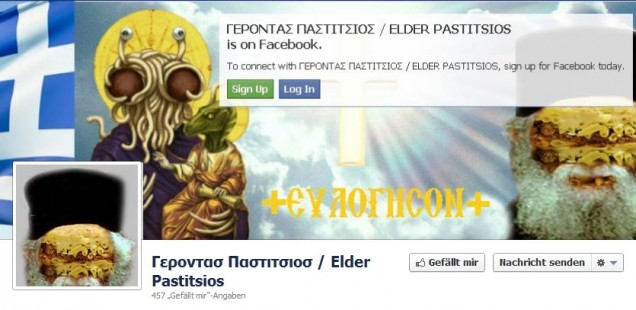From “Paisios” to “Pastitsios” there’s a blasphemy | PirateTimes

From “Paisios” to “Pastitsios” there’s a blasphemy
A 27 year old was arrested by Greek police on charges of blasphemy, because on his Facebook page he satirized a monk, well known as Elder Paisios, paraphrasing his name to Elder Pastitsios, referring to the famous Greek food “pastitsio”, macaroni pie with minced meat.
Are there limits to freedom of expression? Is there censorship in satire?
The answer depends on from which angle one sees things, but no one can close his eyes when constitutional rights are being blatantly violated. And in the case of the 27-year-old from Psahna Evia, his inspiration was considered offensive, after seeing the police entering his home, make seizure of his computer and waiver of confidentiality, to open his account on Facebook, even for alleged blasphemy and insults religion.
This fact was discussed by the Pirate Party of Greece on a press release entitled “Practicing in censorship”, in which they say it was unnecessary lifting of secrecy:
“Although the adoption of ACTA wrecked in the European Parliament, resident judges and prosecutors do not know.
This offense is a misdemeanor and not a felony, and in no way justifies downgrade based on the law N.2225/1994 (as amended and in force), in conjunction with Article 19 of the Constitution for “particularly serious crimes” with effect of violating the privacy rights of young users.
We believe in respecting individual liberty, freedom of expression, privacy and confidentiality of communications and that the “lawful” actions of the authorities to refer the young user was arbitrary and unlawful.”
The case originated from a question asked in Parliament by an MP of the far-right nationalist party Golden Dawn, previously known for its views on immigrants, people with disabilities and homosexuals, calling for the intervention of the Minister of Justice.
The mobilization of digital community was immediate. Many groups in support of the 27-year-old were created, while the tag #FreeGeronPastitsio became an international topic and reached up to 2nd place in world tweet trend, filling the internet with photos of macaroni pie.
However, lawyers say that since the young man didn’t challenge the symbols of orthodoxy, but a simple man who died in 1994, there is no case that he insulted religion.

About Stathis Leivaditis
The English “pirate” is derived from the Greek word “πειρατής” (peiratēs) and this in turn from the verb “πειράομαι” (peiráomai), “I attempt”, which is a derivative of the noun “πείρα” (peîra), “experience”. Coming from the depths of the centuries, the word “pirate” took on another dimension in our days. The ruling classes saw pirates as rebels and hated them. Rebels without a state, they were not submissive to any law, except from the laws they instituted themselves, improvising together. This is the feeling of a Pirate: when something doesn’t work, you have to attempt to bring a new concept. Sometimes it goes beyond a certain point and perhaps exceeds certain limits, because it is an expression of challenge; the challenge to change the system. I’m a member of the Board (and former chairman) of Pirate Party of Greece, also a member of press team of PPGR, former journalist, now a free lancer. I’m in the team of Pirate Times from the start, I joined voluntarily and consciously because I am interested to meet pirates from around the world, to exchange views and spread the pirate spirit.
All content is CC-BY if not mentioned otherwise. Please link back to us if using content.















So what if he did insult religion? Religion itself is an insult to humanity.
The charges are of blasphemy, so whether or not he insulted religion determines his punishment.